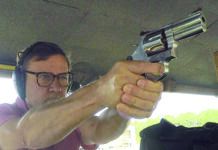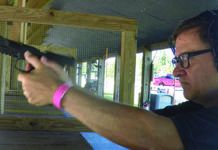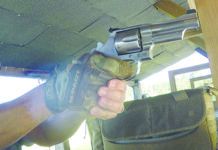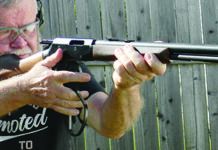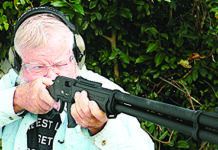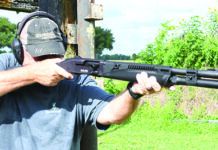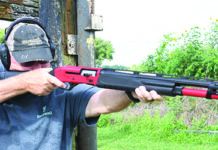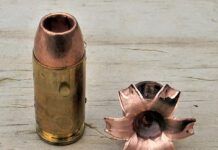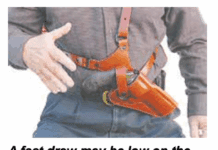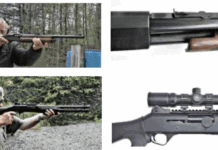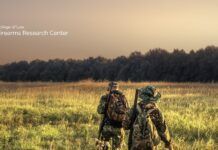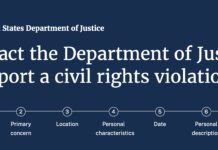Anti-Gun Litigation Continues Despite Laws Senate Passage
In early October, the Supreme Court refused to block a lawsuit against gun manufacturers accused of negligence for firearms violence in the nations capital. The case is Beretta v. District of Columbia, 05-118.
Firearm manufacturers had asked the U.S. Supreme Court to review a District of Columbia Court of Appeals ruling allowing individuals who allege injuries stemming from gun violence to proceed with strict-liability-based public-nuisance claims against the manufacturers.
The District of Columbia has strict rules about gun possession, and justices had been told that its law interfered with the gun commerce in other states. Twelve states had urged the Supreme Court to hear the case and rule with gun makers: Alabama, Colorado, Michigan, Montana, New Hampshire, North Dakota, Oklahoma, South Dakota, Texas, Utah, Washington, and West Virginia.
The gun makers say the implications of the case extend beyond the manufacture and sale of firearms because the ruling could encourage similar lawsuits against all product manufacturers in the United States.
In a filing written by Theodore Olson, the lawyer for the gun companies and former Solicitor General, the gun makers said, The District of Columbias statute threatens … gun manufacturers with draconian penalties based on their lawful out-of-state commercial activity – and on the criminal misconduct of third parties over whom the manufacturers have no control.
The U.S. Court of Appeals for the District of Columbia Circuit had ruled last spring in the case against Beretta USA Corp., Smith & Wesson Corp., Colts Manufacturing Co., Glock Inc., and other companies.
In April the appeals court began considering the constitutionality of the districts Assault Weapons Strict Liability Act, passed in 1976. Also, the appeals court considered if a trial court ruled properly in dismissing all common-law negligence and public-nuisance claims against the manufacturer defendants.
The plaintiffs, nine victims of gun violence, filed suit alleging that, despite the 1976 ban on unregistered firearms including high-power semiautomatic assault weapons, gun makers use sales techniques that permit guns to flow to local criminals. The manufacturers say the D.C. law – the only one of its kind in the nation – infringes upon federal firearms regulations, under which many or all such weapons may be otherwise legal.
The manufacturers failure to regulate the dealers operations, the suit alleged, results in the constant plague of gun crime, creating a public nuisance. A District of Columbia Superior Court judge dismissed the suit, saying the action was riddled with legal deficiencies, and the gun makers owed no legal duty to the plaintiffs.
No due process issue is raised by legislation that seeks to redress injuries suffered by district residents and visitors resulting from the manufacture and distribution of a particular class of firearms whose lethal nature far outweighs their utility, Judge Michael Farrell wrote.
In April 2004 a three-judge Court of Appeals panel revised the dismissal order, permitting each of the nine citizen plaintiffs to pursue individual claims against the defendants. The panel also said the District of Columbia could attempt to recover unreimbursed public-safety expenses related to the defendants but that the government had no individual right of recovery under the assault-weapons law.
The parties moved to have the Court of Appeals rehear portions of the case. The high court instead opted to vacate its decision and hold an en banc hearing on the propriety of the plaintiffs claims and the defendants charge that the assault-weapons ban is unconstitutional because it attempts to control gun manufacturing outside the District of Columbia.
The full Court of Appeals said neither the District of Columbia nor the individual plaintiffs can proceed on common-law negligence or public-nuisance charges because the general tort concepts of duty and forseeability do not permit [their] recognition.
It also rejected the manufacturers claim that the Assault Weapons Strict Liability Act was unconstitutional and violated due process, saying the law addresses a pressing concern for public safety.
The gun makers claimed the law is unconstitutional because it regulates out-of-state commerce.
The purpose of and consequence of the act is to deter manufacturers from making and selling their lawful, nondefective products in other states, the petition said.
Our Take: That the lawsuit continues underscores the need for the U.S. House of Representatives to pass S. 397, The Protection of Lawful Commerce in Arms Act. The Senate has already passed S. 397, and House action is next. The bill would prevent wrongful civil liability lawsuits against gun companies, which the Supreme Court allowed to continue in Beretta. The bill was passed by a bi-partisan vote of 65-31 in the Senate.
———-
2nd Amendment Gets 1st Amendment Protection
Gun enthusiasts won a federal court victory when they claimed an Alameda County (California) ordinance that bans guns on county property violated their free-speech rights. U.S. District Court Judge Martin J. Jenkins cleared the way for a new First Amendment challenge to the 1999 ordinance.
County attorneys had asked the judge to dismiss the challenge, arguing that the gun ban is a public safety issue rather than a constitutional one, but Jenkins said the plaintiffs had sufficient grounds to continue with their lawsuit.
Plaintiffs have articulated a particularized political statement that they intend to convey through possessing guns at gun shows, Jenkins wrote in denying the countys request for dismissal. Plaintiffs have sufficiently alleged that their conduct … constitutes speech.
The legal challenge is the latest in long-standing attempts to overturn the countys ban. The main plaintiffs in the case are gun show owners Russell and Sallie Nordyke of Willows, who promoted gun shows at the Alameda County Fairgrounds in Pleasanton from 1991 to 1999, when the county adopted an ordinance making illegal the possession of firearms on county property.
The ordinance came in response to a 1998 fairgrounds shooting in which eight people were wounded.
The 9th U.S. Circuit Court of Appeals in San Francisco had earlier sided with the county and rejected show promoters arguments that their First and Second Amendment rights were violated, but the court said they could raise the challenge again once the law actually kept them from exercising what they believe are their rights.
The plaintiffs appealed the ruling to the U.S. Supreme Court, which declined to take the case last October.
The Nordykes attorney, Donald Kilmer of San Jose, said they retooled their complaint. Specifically, Kilmer argued that possessing guns at gun shows expresses a firmly held belief in the Second Amendment right to keep and bear arms and conveys support for the National Rifle Associations interpretation of the Second Amendment.
In a statement, Kilmer said the judge agreed that having guns at gun shows can be constitutionally protected expressive conduct – a form of free speech.
Our Take: We agree completely with attorney Kilmer, whose brief said, Gun shows are cultural events and are protected by the First Amendment and the California Constitutions Freedom of Expression clause.
———-

Smith & Wesson Receives
U.S. Army Pistol Order
Smith & Wesson will supply 5,530 pistols to the U.S. Army Security Assistance Command (USASC) Special Projects Office for shipment to the Afghanistan National Army. The order is a follow-on to Smith &Wessons initial shipment of 4,850 pistols for the Afghanistan National Army earlier this year. The current order, valued at approximately $1.2 million, represents the third award to the company by the U.S. Army since April for security forces in Afghanistan and brings the companys total military orders in 2005 to more than 22,500 pistols.
Michael Golden, president and CEO, said, We continue to execute on our strategy to increase our efforts to supply pistols to the U.S. government and military.
Our Take: One of the SW9VEs big positives is its tool-less disassembly. We gave a similar gun, the SW40VE, a Buy It rating in the July 2005 issue.
———-
In Florida, Your Car May Be Your Castle
Beginning October 1, Florida residents began enjoying the presumption that they could protect themselves in a car or anywhere else he or she is entitled to be under a legal concept derived from English Common Law, known as the Castle Doctrine.
It has been long held that people have the right to stand their ground if attacked in their home. Previously under Florida law, people acting in self-defense outside their home or workplace were supposed to use any reasonable means at hand to escape the danger, including retreat. The new law says they can meet force with force.

Running away is a good way to get shot in the back, raped or otherwise harmed, said state Rep. Dennis K. Baxley, a sponsor of the law.
Baxley, a Republican from Ocala, said the new legislation explicitly enshrined that principle in Florida statutes and extended the concept of a persons castle to personal space in a car or anywhere else he or she is entitled to be.
We want people to know that the law contains a presumption that they have the right to protect themselves, Baxley said.
Last spring, the legislation sailed through the Florida House 94-20, was unopposed in the state Senate and was signed by Gov. Jeb Bush.
Our Take: Score one for the good guys: The law sends an unequivocal message both to would-be assailants and innocent citizens that potential victims have the legal option of protecting themselves. Its been proven that good people can use rational decisions about whats necessary to save their life. Hopefully, Florida may have started another trend with its recasting and broadening of the Castle Doctrine. NRA staff members in Washington said lawmakers in at least two other states, Michigan and Alabama, were considering similar legislation.
———-
Brazils Gun-Ban Referendum
Should the sale of all types of guns and ammunition be banned nationwide for everyone except the police and military? Thats the question Brazils residents will decide in a national referendum Oct. 23.
In a vote in which all adults must participate (voting is optional for those over 70), Brazil will be the first country to consider a proposed gun ban on the national ballot. Brazil has the highest number of firearms fatalities in the world, with more than 36,000 people shot dead last year, according to government figures.
Initial surveys indicate that most Brazilians favor a ban, hoping it will at least reduce the large number of guns circulating in the country. Opponents argue that banning guns will do little to stop criminals while making it harder for citizens to defend themselves.
Internationally, gun control advocates and opponents are monitoring the campaign closely, studying the possibility that the referendum could be replicated elsewhere.
If the ban is passed, then I definitely expect other countries to try the same thing, said Rebecca Peters, director of the International Action Network on Small Arms, a coalition of nongovernmental organizations leading a U.N. effort to curb the illegal gun trade.
It will send a message to other countries influenced by powerful gun lobbies that its possible to work around them, she said.
Our Take: Gun Tests readers who travel into or live in Brazil say television and radio stations have championed the ban and promoted a ban on guns for the past two years. The issue was even incorporated into the story line of one of the most widely watched soap operas.
Our guess is the referendum will pass, then five years from now, the country will be able to recognize a corresponding massive spike in gun violence, following the trend of England and Australia.
———-
…Perhaps Brazilians Should Hear From This Native American
Heres the title of a speech that several million Brazilians should hear before they vote themselves out of gun ownership: He Who Takes My Weapon Is My Enemy: An American Indian View of the Second Amendment.
David Yeagley, a member of the Comanche Nation, is a columnist for the Internet magazine Front Line, in which he advocates conservative ideas from a Native-American viewpoint. The liberal arts professor holds degrees from Oberlin, Yale, Emory, the University of Hartford and the University of Arizona and currently teaches at the University of Oklahoma.
The professor often talks about the importance of owning a weapon in Native-American society. Owning a weapon is a precious freedom, he said in a recent speech.
Yeagley spoke of his Native-American heritage, citing the Comanche Indians as having once been considered the largest hunting empire in America. They were not known for peace or tranquility, he acknowledged. However, Yeagley said that the Comanches were not a warlike nation that actively took over other territories; they merely intimidated other Indian nations in order to keep them off of their lands.
Land and resources are valuable assets, said Yeagley. If you have them, someone will want to take them.
The professor questioned why someone would want to take away another persons gun. Do they want to prevent you from protecting what you have? he asked.
The professor said that the surrender of arms suggests submissiveness to the government, which by definition should be of the people, for the people and by the people.
In modern history, every nation that has disarmed its people has turned into a tyrannical, oppressive government, Yeagley commented.
Giving up your gun to someone else on demand is called surrender, Yeagley said. It means that you have given up your ability to protect yourself to a power that is greater than you.
Our Take: Regarding gun ownership, Yeagley is spot on. To read more of his views, log on to <www.badeagle.com>.




